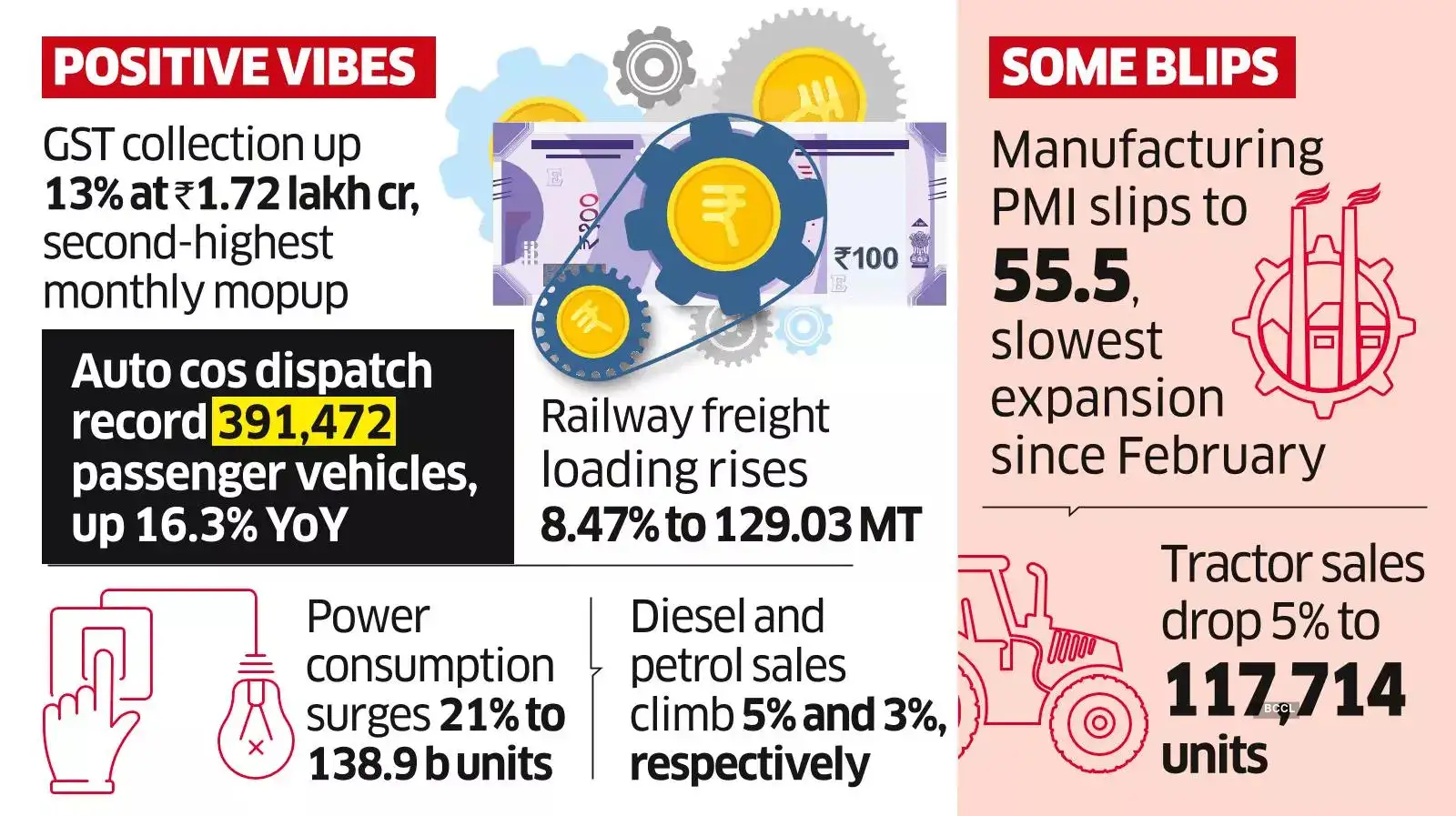However, the seasonally adjusted S&P Global India Manufacturing Purchasing Managers’ Index (PMI) slipped to 55.5 in October from 57.5 in September, its slowest expansion since February.
Other fast-moving indicators remained robust. Auto companies dispatched a record 391,472 passenger vehicles to dealers last month, up 16.3% from 336,679 the year earlier.
Indian Railways’ freight loading rose 8.47% in October to 129.03 million tonnes. Electricity consumption surged 21% in the month to 138.9 billion units in October amid a hotter-than-usual first half of the month. Diesel and petrol sales by oil retailing companies rose 5% and 3%, respectively, from a year earlier.
Economists say most indicators remain elevated but there are signs of growth slowing.
“India’s manufacturing sector generated substantial growth in October, despite a challenging global economic environment,” said Pollyanna De Lima, economics associate director at S&P Global Market Intelligence. Two-wheeler sales
“Still, insights from surveyed purchasing managers pointed to the deceleration of several measures,” she said.
The conflict in West Asia, rising US interest rates, and volatile oil prices are also adding to the uncertainty, the economists added.
Core sector output grew 8.1% in September, down from the double-digit 12.5% rise in the preceding month. Tractor sales fell from a year earlier in October, suggesting tepid rural demand following a patchy monsoon. They dropped 5% to 117,714 units from 123,526 units, according to data sourced from Tractor Junction, an online aggregator for tractor and farm equipment.
Domestic sales of motorcycles and scooters increased in healthy double-digits last month amid improved consumer sentiment in the ongoing festive season. Market leader Hero MotoCorp reported a growth of 26.4%, selling more than half a million units in the local market in October.
Industrial production had risen to a 14-month high of 10.3% in August, driven by a pre-festive surge.
A print above 50 for PMI means expansion, while a score below 50 indicates contraction.
According to the survey, there were substantial, albeit slower, increases in total new orders, production, exports, buying levels, and stocks of purchases. Hiring activity faded, and business confidence slipped to a five-month low.
“The October manufacturing PMI corresponds with hard data on industrial production; both indicators remain elevated, but signal slowing growth,” said Rahul Bajoria, MD and head of EM Asia (ex-China) economics, Barclays.

Growing compliance
The gross GST collection till October was Rs 11.64 lakh crore. The monthly revenue crossed Rs 1.60 lakh crore for the fifth time in the current fiscal year on the back of a 13% jump in domestic transactions, indicating a pick-up in consumption. This is the eighth month in a row that the monthly GST mop-up has come in above the Rs 1.5 lakh crore mark.
“A mid-year collection of such an increased number is definitely worth a cheer and the ongoing festivities-driven consumption could help this continue,” said Abhishek Jain, indirect tax head and partner, KPMG.
The use of technology and data by tax authorities to detect evasion has also contributed to the growth in GST collections.
“The remarkable growth in GST collections over the past few months is not only on account of the underlying strong economic factors, but also due to the efforts of the tax authorities in deploying tools to compare data sets to determine short payment and evasion,” said MS Mani, partner, Deloitte India.
EY tax partner Saurabh Agarwal said, “India is working well towards the increased collection. With the stable collection, the government can now consider rate rationalisation as the next task.”
According to ICRA, the October revenue is higher than expected and the overall collection for FY24 is likely to cross budgeted estimates.
“At present, we project the CGST (central GST) collections to mildly exceed the FY2024 BE,” said Aditi Nayar, chief economist, ICRA.
Of the total, Rs 30,062 crore is CGST, Rs 38,171 crore is state GST (SGST) and Rs 91,315 crore is integrated GST (IGST), including Rs 42,127 crore collected on the import of goods. The cess collection stood at Rs 12,456 crore, including Rs 1,294 crore on import of goods.








